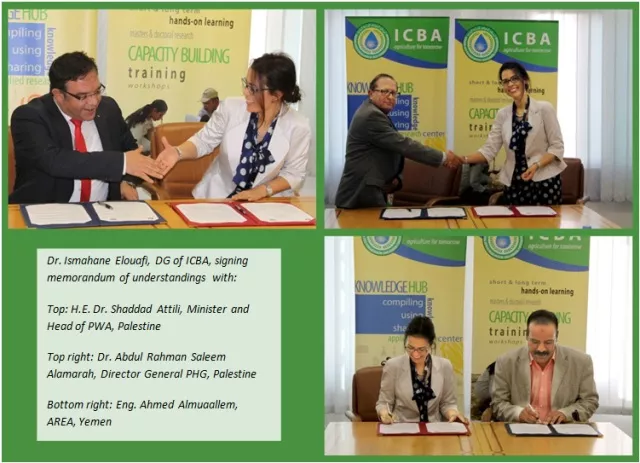ICBA’s MAWRED Project Signs Three Memorandums of Understanding
27 February 2014
Managing the challenges of water and food security in arid Middle East North Africa requires careful management supported by good data. Against a background of declining ground water and growing demand for water across many economic sectors decision-makers need to manage a careful balance to protect future supplies. Given the large share of water used in agriculture it is important to understand the state of the water resource and crop systems and where and how much irrigation is taking place. This data is limited in many countries and often out-of-date or inaccurate. The Modeling and Monitoring of Agriculture and Water Resources Development (MAWRED)’s project aims to support the MENA region’s decision-makers by helping fill this gap using satellite imagery and leading-edge water, climate and crop modeling.
The International Center for Biosaline Agriculture (ICBA) in coordination with USAID’s Office of Middle East Program (OMEP) and NASA’s Goddard Space Flight Center are developing new data sets that will be used directly by key country (Iraq, Yemen, Palestine and Tunisia) ministries and other decision-makers. This information will be used in crop mapping and modeling – new maps of crop groups, irrigation areas, and estimates of yield for key crops; water mapping and modeling – regular data on groundwater, surface water, soil moisture, irrigation water use and evapotranspiration.
Three new partners have joined MAWRED project – the Palestinian Water Authority (PWA), the Palestinian Hydrology Group (PHG), and the Agricultural Research and Extension Authority (AREA) in Yemen. A Memorandum of Understanding was signed by Dr. Ismahane Elouafi, Director General of ICBA, and each of these organizations. ,
Dr. Rachael McDonnell, head of the MAWRED project at ICBA, said that her team was looking forward to working with Palestine and Yemen in the MAWRED project; this will prove to be a great opportunity to accelerate the project and validate the data gathered by MAWRED team regarding Palestine and be important for the success of the project in Yemen. Dr. McDonnell concluded, “I am thankful to all the partners of ICBA that made this project a reality and particularly USAID’s Office of Middle East Program (OMEP) and NASA’s Goddard Space Flight Center. We look forward to working with more countries in the future this project.”











